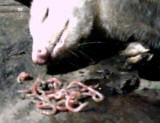Wildlife Damage Inspection Training Course
This course was originally designed to train individuals interested in getting involved with wildlife damage inspection on a professional basis. Homeowners, building inspectors, and do-it-yourselfers will find the information helpful as well.

Special Comments for Home Inspectors
Please keep in mind that this course was designed for wildlife damage operators called to a home with a problem. While most home inspectors are involved in evaluating a building for a potential buyer, this information will be helpful in that:
- you will more easily recognize active animal sign.
- you will see clues where people have had problems in the past and have worked to resolve them (i.e. chimney caps, screened vents, modified bird feeders).
- you will become sensitive to the effect that bird feeders, pets, and building maintenance have on encouraging or hindering animal populations.
- you will be challenged to inspect certain areas with a new perspective that you didn’t have before.
Before you get started
The following section covers introductory issues that you need to address before getting involved in animal damage inspection. Stephen Vantassel, original author of this document, raised legal and safety problems that must be resolved before you begin on-site inspections.
Course Length:
The course is divided into 4 units
- Unit 1 has 3 lessons
- Unit 2 Equipment and Tools has 5 lessons
- Unit 3 Types of Inspections has 4 lessons
- Unit 4 Prevention and Species has 6 lessons
Depending on how fast you read, it can take up to 2 hours to complete.
Before you get started in any animal damage inspection activities, it is important that you keep a few things in mind.
 Inspection Work is Dangerous
Inspection Work is Dangerous
First, inspections can be incredibly dangerous. A quality inspection frequently requires you to climb a ladder, scale a roof, crawl in an attic (and you may not know exactly what you are crawling through), navigate a cluttered basement, and respect difficult clients, not to mention the possibility of getting up-close and personal with an animal. Physical fitness is a must. You don’t have to be a professional athlete, but you must be coordinated and able to lift yourself up to an attic entrance while remembering that you can only step on the studs. You must be able to carry and manipulate a heavy ladder. People have become severely injured and even died while performing animal damage control work, which includes inspections.
Animal damage inspectors also expose themselves to the risk of biological hazards. Animals can carry a variety of diseases that can be transmitted to humans through bites, feces, urine, and parasites such as fleas. The photo shows worms that emerged from a dead opossum.  One problem is how little we know about zoonotic diseases (animal-borne diseases that are transmitted to humans). Medical doctors will continue to learn more but that may be because more and more people will be exposed as they work in the animal damage control field. In other words, medicine may advance because people like you are the guinea pigs from whom they learn more. To learn more about diseases visit Diseases on this site. If you considering wildlife damage control as a career, strongly consider getting the prophylactic rabies vaccine. Talk to your doctor about whether you are a good candidate for the protection.
One problem is how little we know about zoonotic diseases (animal-borne diseases that are transmitted to humans). Medical doctors will continue to learn more but that may be because more and more people will be exposed as they work in the animal damage control field. In other words, medicine may advance because people like you are the guinea pigs from whom they learn more. To learn more about diseases visit Diseases on this site. If you considering wildlife damage control as a career, strongly consider getting the prophylactic rabies vaccine. Talk to your doctor about whether you are a good candidate for the protection.
You don’t have to be a rocket scientist to perform a quality animal damage inspection, but you do need to follow proper safety rules. And even then, following the safety rules may still result in injury or disease or worse.
For example, you may have properly stepped on only the studs when walking in an unfinished attic. But you could still fall through if the studs are too weak to support your weight. Here is another example. Let’s say you are wearing a properly fitted HEPA filter face mask to protect your lungs from the fungal spores that cause histoplasmosis. Unfortunately, the spores could enter your body through the mucosa of your eye and infect you that way. This is a rare way to contract histoplasmosis, but it is possible.
Inspection involves Legalities
Most governments have regulations regarding the control of wildlife. Some have laws pertaining to those who call themselves inspectors. Be sure to consult your state or provincial government’s laws before entering this field. Check out some additional information. For an international association of professional wildlife damage controllers, check out the National Wildlife Control Operators Association (http://www.nwcoa.com) It can help you in your search for this sort of information as well. While they can’t provide legal advice (they aren’t lawyers), they are people in the business who can help you find the right information for yourself.